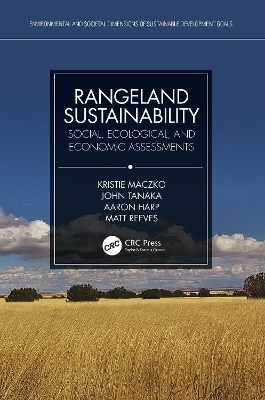
Rangeland Sustainability
CRC Press (Verlag)
978-1-032-24679-6 (ISBN)
This book provides an integrated description of the indicators of rangeland sustainability that capture ecological, economic, and social dimensions. It takes a fresh look at the information available on current and emerging issues across rangelands, and presents collaborative research for future progress. Authors offer a framework for evaluating rangeland sustainability, the best available data to use, as well as an interactive tool for use at a variety of geographical scales. Readers with limited knowledge of rangelands, as well as professional rangeland ecologists and land managers, will gain an understanding of the best tools available today to assess sustainability across rangeland ecosystems in the U.S.
Dr. Kristie Maczko is a Research Scientist at the University of Wyoming and Executive Director of the Sustainable Rangelands Roundtable (SRR). She was previously the co-director of Colorado State University’s Rangeland Resources Institute. Dr. Maczko has spent over 18 years working with federal and state agency personnel, policy experts, professional societies, producer groups and other stakeholders to advance common understanding of sustainable rangeland ecosystems. Most recently, she has worked with SRR teams surveying social and economic characteristics of ranchers. In addition, Kristie represents the Sustainable Rangelands Roundtable on the US Roundtable for Sustainable Beef. She serves as vice-chair for an inter-university research group studying ecological and economic resilience of rangeland systems. She also is a member of the National Grazing Lands Coalition’s Advisory Committee. She received her Ph.D. in Ecology from Colorado State University, M.S. from University of Memphis, and a B.A. and B.S. from Rutgers University. Dr. John Tanaka is currently an Emeritus Professor at the University of Wyoming and working part-time for the Sustainable Rangelands Roundtable. He has a BS and MS in Rangeland Resources from Oregon State University and PhD in Range Science with emphasis on range economics from Utah State University. He was a rangeland economist with Oregon State University and research scientist at the OSU Eastern Oregon Agricultural Research Center focusing on sustainable ranching. Dr. Aaron Harp is currently working part-time for the Sustainable Rangelands Roundtable, focusing on social indicators of sustainability. He earned a B.A. in Economics at California State University, Sacramento, an M.S. in Agricultural Economics and a Ph.D. in Rural Sociology, both from Penn State University. He was an Assistant and then Associate Professor of Rural Sociology in the Department of Agricultural Economics and Rural Sociology at the University of Idaho from 1992 to 2000. Since 2000, he has consulted for government agencies and private entities seeking insights into relationships between natural resource and public land policies and the economic and social organization of rural communities. Dr. Matthew Clark Reeves (Matt Reeves) is a Research Ecologist with the Rocky Mountain Research Station in Missoula. He received his BS in Range Management (1995), MS in Environmental Resources (1999) and his PhD in Remote Sensing and Ecological modeling of rangeland and agricultural environments (2004). Matt specializes in applying remote sensing and modeling to characterizing ecological dynamics of rangelands. His research follows four basic themes including climate change, vegetation dynamics, anthropogenic disturbance, and decision support tools, such as digital state & transition simulation models, for improving management efficacy.
1.Introduction to the Sustainable Rangelands Roundtable and the National Assessment, 2.Ecological Indicators, 3. Social and Economic Rangeland Sustainability Indicators,4. The Challenge of Social Indicators and Sustainability, 4. Assessing Rangeland Sustainability, 5.What the Data Show: Integrating Ecological, Social, and Economic Rangeland Sustainability, 6.Case Studies, 7.Missing Key Elements in Rangeland Sustainability Assessment – Future Research 8. Needs, Conclusion and Closing Thoughts,
| Erscheinungsdatum | 19.04.2022 |
|---|---|
| Reihe/Serie | Environmental and Societal Dimensions of Sustainable Development Goals |
| Zusatzinfo | 24 Tables, black and white; 18 Line drawings, color; 2 Line drawings, black and white; 72 Halftones, color; 90 Illustrations, color; 2 Illustrations, black and white |
| Verlagsort | London |
| Sprache | englisch |
| Maße | 156 x 234 mm |
| Gewicht | 300 g |
| Themenwelt | Naturwissenschaften ► Biologie ► Botanik |
| Naturwissenschaften ► Biologie ► Ökologie / Naturschutz | |
| Weitere Fachgebiete ► Land- / Forstwirtschaft / Fischerei | |
| ISBN-10 | 1-032-24679-0 / 1032246790 |
| ISBN-13 | 978-1-032-24679-6 / 9781032246796 |
| Zustand | Neuware |
| Informationen gemäß Produktsicherheitsverordnung (GPSR) | |
| Haben Sie eine Frage zum Produkt? |
aus dem Bereich


